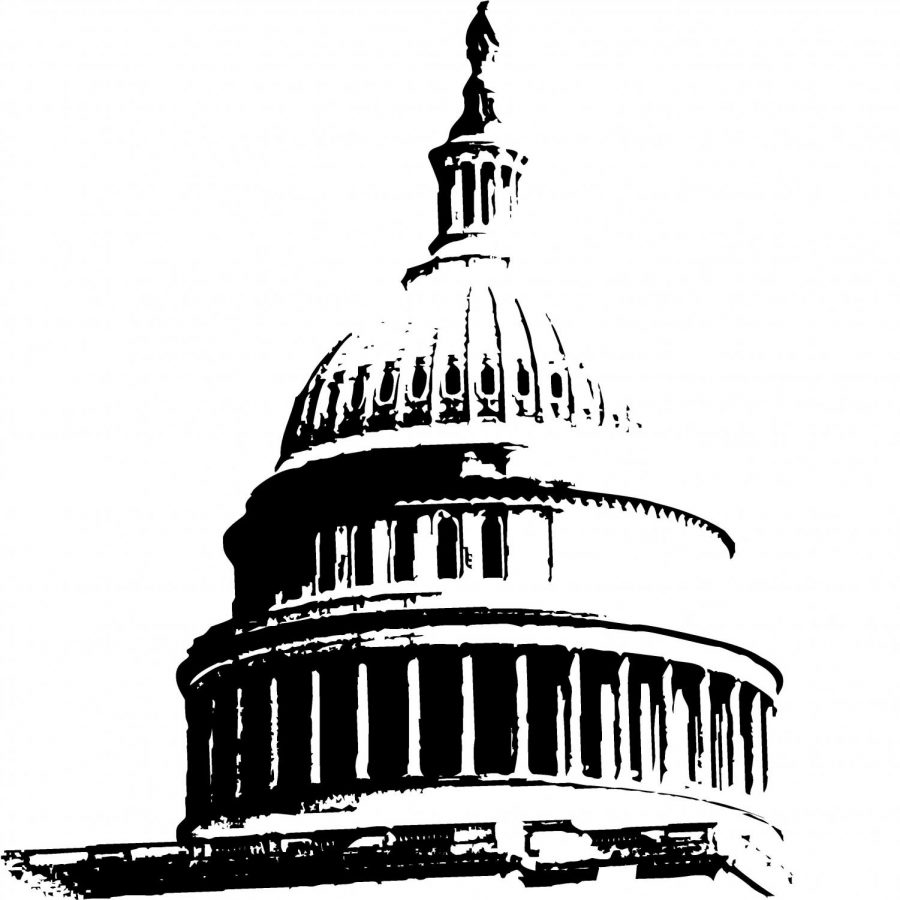Political Revolution: Democrats seek to implement policy changes in 2020
March 5, 2020
The start of the new decade, 2020, could also kick-start a brand new, refreshing chapter of American politics through the November 2020 presidential election. It seems with every election, people say, “This will be the most important one of our lifetime,” and it’s certainly no different coming into the new decade. As tensions rise among political parties, new challenges face the 2020 candidates that have enormous effects on the future.
One huge question going into the early stages of the 2020 election was: Why were there so many Democratic candidates in the first place? Well, for starters, there is no Democrat seeking re-election in the White House, considering that Republicans control the Senate. In the beginning, there wasn’t a clear and concise rise-above-the-rest Democratic candidate, and lastly, there is a real good chance (not certain) that a Democrat could win in 2020, considering how polarizing President Trump’s approval rate is with both Republicans and Democrats. This creates the perfect storm for plenty of candidates to choose from. According to Ballot Pedia, a nonpartisan political encyclopedia, there were 302 Democratic candidates who pledged to run in 2020, but as of March 5, this list has been slashed all the way down to a mere three.
The Democratic leaders include former Vice President Joe Biden and Vermont Sen. Bernie Sanders. Biden is the clear leader, as he is leading the pack by quite a bit. With the momentum he has seemed to have this whole campaign, junior Louis Riemer has some concerns with Biden.
“I’m worried that if Biden becomes the nominee, I don’t think he’s strong enough to beat Trump,” Riemer, who is involved in his first year of Lincoln Southeast High School’s Young Democrats club, said.
Trump’s impeachment for abuse of power and obstruction of Congress, in December 2019, has brought up questions revolving what public opinion will be for his campaign for re-election.
“A lot of Trump supporters seem to be behind Trump no matter what and they’ve already gone through something similar with the Mueller report,” Riemer said. “So, I don’t think they care if it’s just another bad thing, because it’s just Trump.”
One of the biggest talking points of the election so far is what to do with health care coverage. It’s no secret that many other highly industrialized countries like the United Kingdom and the Netherlands have more efficient, socialized health care. Democrats have proposed similar health care systems that are more socialized and cost much less to citizens. A lot of the candidates propose a single-payer health care system. A single-payer system is a type of universal health care financed by taxes on citizens. In 2017, the U.K. spent the United States dollar equivalent of $250 billion dollars, about $4,000 per person in the U.K. Now compare that to the $3.2 trillion dollars the U.S. spent in 2017 on health care; about $10,000 per U.S. citizen.
LSE senior and chairman of Teenage Republicans club, Maxwell Smith, is concerned about the downsides of a single-payer health care system.
“Socialized health care in general is unfair to the healthy, because if you don’t need it, then you’re still paying into it. Either way, it just increases the taxes. But I believe that our health care system is far too expensive,” Smith said.
The Democratic candidates agree on one huge reason why the American individual health care system is inefficient, that being the lack of health insurance coverage. Health insurance is expensive. In Nebraska alone, health insurance costs in 2019 were about $838 a month. According to the Public Broadcasting Service (PBS), 44 million people in the U.S. do not have health insurance and another 38 million don’t have adequate health insurance.
“Everyone agrees that the health care system’s messed up, and [there] aren’t very many people that think we should keep it the way it is. So I think that Trump will have to come out with something that seems a little more progressive like Bernie Sanders’ ‘Medicare for All,’” Riemer said. “I understand not thinking that it’s the best option, but I feel like it gets people out to vote so that that’s important because Bernie gets good voter turnout, and one of those reasons is ‘Medicare for All.’”
Many high school seniors and juniors across the country are going to vote for the next president this coming November. So it will be very important for them, considering the kind of policy maker our generation wants in the White House, as this generation is in such a transitional period and our lives start to make impacts.
A lot of Democratic voters are scared for the future of not only the White House, but for the entire world. As we know, climate change is a very frequent topic in the debates as well, and buzzwords like “global warming” and “carbon emissions” seem to peak the interest of Democrats more than the Republicans. One of Trump’s first acts as president was pulling the U.S. out of the Paris Climate Agreement in 2016. In recent years, climate change has often resonated more with the younger generation of voters, having been sparked by young activists such as Greta Thunberg, establishing the foundation of what is important to students.
“I would agree that the switch could be very beneficial to the American people. Like most things, it would be very important as to how we do that. I would strongly support the idea of continued research by businesses that would make renewable energy an option for all. Having renewable energy could drive down energy costs, and help us to have less obligations and ties with foreign powers, as well as help us take care of our planet,” Smith said.
Sanders has the most radical climate change plan and the most expensive. He has adopted the Green New Deal for his approach, which includes income taxes from 20 million new jobs, taxes on fossil fuels and defense budget savings. The money would fund deployment of renewable energy and technologies. Sanders also plans to tackle the fossil fuel industries head-on by pursuing legal action against companies like Exxon Mobil.
Another hot topic of the debates is the huge wealth gap in the U.S. that just seems to be getting bigger and bigger. According to the Washington Center for Equitable Growth, the wealthiest 10 percent in this country owns 70 percent of all the income in the U.S. Massachusetts Sen. Elizabeth Warren (no longer in the race) developed taxing plans for the richest of Americans. Andrew Yang (no longer in the race) had a radical approach of a Universal Basic Income (UBI) of $1,000 a month for every American to do with what they please.
Yang’s idea for a UBI sprouted from his economic background. He believes that automation of jobs like office workers, drivers and factory workers are at risk in the future of being replaced by machines. The idea is that through UBI, citizens will use that money to improve health and nutrition, it would increase graduation rates and it would actually create jobs.
Outside of Yang’s idea for a UBI, the majority of candidates have not yet come forward with a plan on how to fix economic inequality, including Democratic poll leader Joe Biden, but a common consensus between Democrats is to embrace a plan on raising taxes on the ultra-wealthy, and create new social programs for impoverished people. Warren and Sanders have similar plans by raising taxes on the 75,000 wealthiest families in the U.S. and finding business CEOs who make at least 50 times more than their median worker and tax those executives, accordingly.
“It’s the Robin Hood method; Take from the rich and throw it to the poor. The issue is, most of the poor are poor because they can’t find a job, or they’re struggling to find a job or their job can’t pay them enough. So then we’re to punish the people that are paying them, people that are giving them jobs, the people that have these options for them,” Smith said.
With policy being proposed by Democratic candidates, something huge is at stake — the future. Whoever wins in 2020, no matter being Democrat of Republcian, there may be big changes coming for better or for worse. So when people talk about this election and say, “This may be the most important election of our lifetime,” they may actually be telling the truth.









